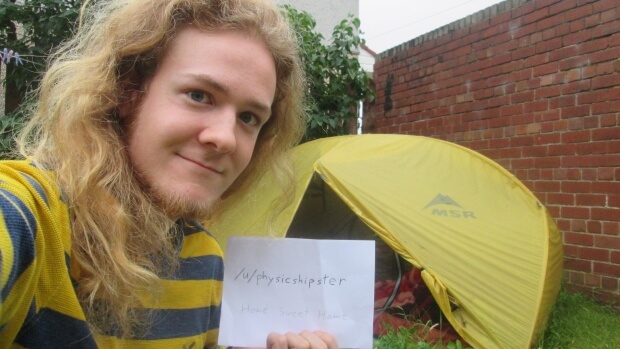MAYBE you think you know a thing or two about saving money as a student. Cooking in bulk, discount cards, turning the lights off, that kind of thing. These things will save you a few pennies, for sure – but none of them can compare with the extreme methods used by these students. Faced with high tuition fees, rent and the prospect of student debt, they used their wits to save thousands on their living costs.
Evan Eames, an astrophysics student from Montreal, realised he didn’t have enough money to live in student accommodation during his course at Manchester. His solution? Camping in someone’s back garden. He posted an advert on Reddit proposing that he’d do household chores and teach a range of subjects in his spare time in return for some rent-free space to pitch his tent. Someone responded, and he lived there for a year...through the cold, often snowy, winter.

Despite this, he remains chirpy:
‘The positives far out-weighed the few negatives. The fresh air and sound of the wind. Waking up to birdsong all around me. I actually slept better in the tent than I think I would have in walls. [...] The savings were around 4000 GBP in the end, not too shabby if I do say so myself.’
A slightly warmer, though not much more comfortable option, is living on a train. Leonie Muller, a German student, was fed up with high rent and landlord disputes. She packed all her essentials and hopped aboard a train, with an unlimited rail card to pay her way. Her blog, There You Are! Travel, documents her journey as a ‘digital nomad’, commuting on trains all across Germany while she studies at Tübingen University. As a result of her experiment, she’s given a TEDx Talk (see below), has nearly 7,000 followers on Facebook, and is using it as inspiration for her thesis. Now that’s ingenuity.
Cramped conditions are nothing new for many students – high rent prices mean many have to settle for small apartments. Joel Weber, a student at the University of Texas, played this to his advantage buy building his own self-contained ‘Tiny House’. Unsurprisingly, Joel is a design major and after studying plumbing, carpentry and reading a lot of architecture books, he was able to build a miniature home-on-wheels, containing everything he needed. In total, the project took one year and cost him $20,000. Compared to the $1,000-£1,900 per month rent he would otherwise be paying in student accommodation, though, that’s a big saving. The tiny house will effectively have paid for itself in just one year, and could even become a long-term home.
'I think when you are the first few on a new trail, there is always thick overgrowth which requires a little extra to cut through,' Joel tells us. 'The unknowns can be a little scary but also can be seen as opportunities to overcome a challenge. My house has taught me many life lessons like this. The dorm life doesn't always teach students the same wisdom. I am making my own college experience and I really am enjoying it.'
You can see more pictures of Joel’s tiny house here.
Having already studied an undergraduate degree, Ken Ilgunas found himself in an all-too-familiar predicament: graduating with a mountain of debt, with no idea how to pay it off. After spending two years working in Alaska, he decided that his postgraduate degree would be different. He was going to continue getting an education, without the debt.
To do this, he first found a programme that would be affordable, opting for Duke University in the USA. He then bought a van for $1,500. After some transformation, the van become Ken’s mobile home, complete with cooking stove, bed and a place to hang clothes. For showering, there was the university gym, and for Wi-Fi he used the library. With a secluded parking space on campus, he was near his classes – but he had to keep the entire thing a secret. He's now written about his experiences in a book, Walden on Wheels.
'I wanted to be a free and adventurous person [...] and you can't do that when you have thirty grand in debt,' he says.
Last, but not least, is the attempt by a Dutch company to address the student housing crisis on a wider scale. It invited students to live on its premises – in a home for the elderly.
While this may not sound like the ultimate in student living, the idea has been a success. Dutch students who had previously struggled to find apartments in overcrowded Amsterdam now live rent-free, in exchange for some hours volunteering in the home. The students teach the home’s residents how to use computers, use Skype to talk to their families, and help run events. The students commit to 30 hours per month, and in exchange they get to save thousands on living costs.
The scheme doesn’t just benefit young people, though: residents of the home gain a lot from the arrangement too. Loneliness, isolation and a lack of activity are all common problems for people living in residential homes, but the care and attention of the students offsets this. It’s a win-win situation - and one that is actually catching on.
Two more homes in the Netherlands have adopted the idea, along with one in Cleveland, USA and Lyon, France. With many countries facing the concerns that come with an ageing population, it could become more than just a money-saving scheme for students.
While the methods Leonie, Evan, Joel and Ken have used to save money are unusual, they represent a response to a wider problem. Modern day students face an assortment of expenses, from the extortionate tuition fees in the US and UK to the inflating price of rent in just about any major city around the world. For both internal and international students, getting into debt in order to get an education seems a matter of course - and it is damaging mental health.

We asked Evan what he’d say to students worried about their finances. ‘Firstly, a tent is a lot of fun. I seriously encourage others to try something similar and strike up an agreement with someone in the area,’ he says.
‘Secondly, don't be passive about letting school fees be pushed up,’ he says. ‘In Quebec we have been militant about keeping our school fees where they are, and as a result we have some of the lowest fees in the world. In the UK they have not been quite as gung-ho, and thus the fees are rapidly becoming absurdly expensive, which will make university more and more of a privilege for the rich.’
Joel is similarly encouraging: 'I think we as students should remember that we don't always have to take the usual path, and it is important to take the time to explore what we really enjoy and pursue it. The current education system has this focus on rushing us through a degree to graduate "on time" and get us into the work force [...] Opportunities to explore new things, that might not always be in our degree plans, could be what fuels a career choice.'
Find more money-saving tips, from finding free food to getting a part time job, at our Student Life section.